一般过去时的被动语态
一般过去时的被动语态

如:I was invited to Anna's birthday party last month.
上个月我被邀请去参加安娜的生日聚会了. ②一般过去时,要强调动作的承受者而不是执行者时,用被动语态. 例:I cleaned my teeth twice before I got to bed last night.(变被动语态) My teeth were cleaned twice before I got to bed last night. 分析:昨晚上床睡觉前我刷了两次牙. 昨晚上床睡觉前,我的牙齿刷了两次. 解答:My teeth were cleaned twice before I got to bed last night.my teeth 是动词 clean 的承受 者,够成被动关系,结合时态一般过去时用一般过去时的被动语态 was/were+过去分词,主 语 my teeth 复数,故 were,clean 的过去分词 cleaned,故答案是 My teeth were cleaned twice before I got to bed last night. 点评:一般过去时的被动语态 was/were+过去分词的呈现,课下要理解记忆各种被动语态的 构成. 【易混淆点】 一般过去时的被动语态与现在完成时的被动语态的区别: 一般过去时的被动语态表示一个被动的动作发生在过去的某个时候,其结果对现在没有影响; 而现在完成时的被动语态的动作或状态尽管发生在过去,但侧重说明该动作或状态对现在造 成的影响和结果. A new school was built by them last year.(发生在去年的被动动作) A new school has been built by them for two years.(表示结果已经被建成) 【解题方法点拨】 ①当句子的主语是动作的承受者时,如果题干有时间状语 yesterday(昨天),the day before yesterday(前天),last …(上一个…),just now(刚刚)a moment ago(刚刚),at the age of (当…岁时),long ago(早已),once upon a time(很久以前),(如:two days)+ago(…之 前),准确时间(如:June25th 2010 等),when(当…的时候) when I was five(当我五岁 时)等.可以根据这些时间状语来确定为一般过去时态的被动语态. ②如果没有时间状语,则根据语境判断句子时态和语态. ③掌握复合句中谓语动词时态语态的用法,特别是含有宾语从句的复合句中. 【中考命题方向】 一般过去时态的被动语态是中考考查的重点,经常在词汇填空,单选题,英汉互译,动词应 用题,完形填空等中考查,题型灵活多样.
五种常用时态的被动语态
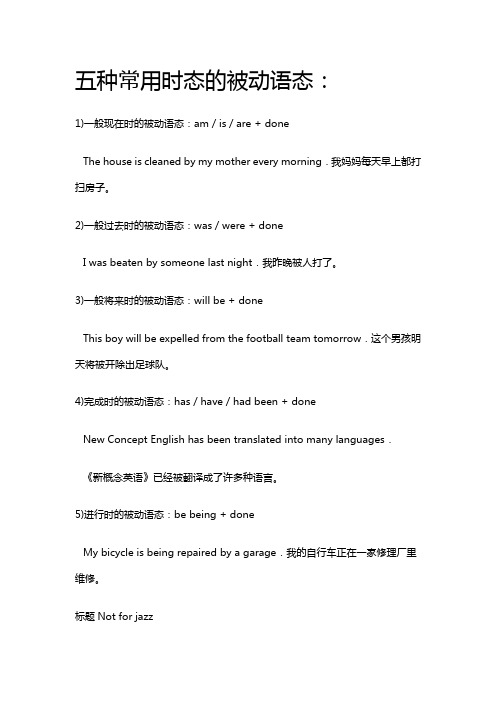
五种常用时态的被动语态:1)一般现在时的被动语态:am/is/are + doneThe house is cleaned by my mother every morning.我妈妈每天早上都打扫房子。
2)一般过去时的被动语态:was/were + doneI was beaten by someone last night.我昨晚被人打了。
3)一般将来时的被动语态:will be + doneThis boy will be expelled from the football team tomorrow.这个男孩明天将被开除出足球队。
4)完成时的被动语态:has/have/had been + doneNew Concept English has been translated into many languages.《新概念英语》已经被翻译成了许多种语言。
5)进行时的被动语态:be being + doneMy bicycle is being repaired by a garage.我的自行车正在一家修理厂里维修。
标题Not for jazz总结for的用法:1)为:I bought a book for you.我为你买了一本书。
2)因为:Something fell in,for I heard a splash.一定有东西掉下去了,因为我听见扑通一声。
4)适合:Not for jazz=It's not suitable to play jazz on the clavichord.古钢琴不适合演奏爵士乐。
Question:What happened to the clavichord?to后面加宾语,表示其身上发生了什么事,即动作的目标、对象。
What happened to you?你怎么了?(在你身上发生了什么事?)(1)否定句与疑问句的被动语态We don’t believe her.我们不信她的话。
一般过去时的被动语态
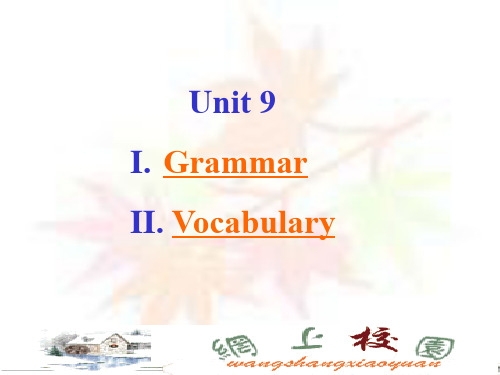
动名词的句法作用
1. 作主语 A) 动名词作主语也可以用先行词it作形式主语,而 把动名词短语置于后部。这种用法通常见于:It’s no use (useless, no good, nice, fun等) + -ing,或There is no use + - ing。 B) 动名词和不定式作主语在意义上有一定的差别: 通常动名词泛指一般动作,而不定式表示具体动作。
eg.
1) The boys avoided fighting. 男孩子们避免了斗殴。
2) He suggested going out for a walk. 他建议出去走走。
3) She is good at telling lies. 她很会撒谎。
4) Before driving any of the buses, they will have to pass a special test.
eg.
1) He was clever enough to compete for the mathematics scholarship.
他很聪明,完全能获得数学奖学金。
2) These young men compete for the silver medal. 这些年轻人争夺银牌。
name v. to give a name to: 给…以名字:
一般过去时的被动语态一般过去时被动语态一般将来时的被动语态现在完成时的被动语态被动语态现在进行时的被动语态过去完成时的被动语态一般现在时的被动语态一般过去时一般过去时被动
Unit 9 I. Grammar II. Vocabulary
I. Grammar
Language focus P147
6. 一般过去时的被动语态

1. 一般过去时的被动语态:was/were + V.过去分词。
2. 一般过去时的主动语态变被动语态。
3. 一般过去时被动语态的不同句式
4. 几种特殊的被动语态
知识讲解
4. 几种特殊的被动语态 1. 有些短语动词相当于及物动词,变为被动句时介
词或副词不能去掉。
e.g. They put off the meeting because of the weather. → The meeting was put off because of the weather.
4. 系动词、不及物动词或某些短语动词(happen, take place, come true, fall asleep…)没有被动语态。
e.g. What happened to Mr. Brown? 布朗先生发生了什么事?
将下列句子变为被动语态。
1. He chose six story books the other day.
by Lisa 宾语
即学即练
将下列句子改为被动语态。 1. The family built a new house last year. →
A new house was built (by the family) last year. 2. My mother bought many vegetables yesterday. →
A. set up C. is set up
B. sets up D. was set up
典例精析
2. (北京中考) These model cars __B__ in China in 2013.
A. are made B. were made
一般过去时被动语态

1.把主动语态的宾语变成被动语态的主语。 2.把主动语态的谓语变成被动语态的be + 过去分词,时 态要与原句保持一致。 3.把主动语态的主语变为介词by 的宾语,放在被动语态 里谓语动词之后, by 短语可以省略。如果原句主语是地 点名词,在被动语态中用in + 地点名词作状语。
语态转换时要注意的问题
加to 的有 pass, show, send…
4.在主动语态中,动词make, let, see, hear, feel, watch, find, notice 等后接不带to 的不定式作 宾语补足语,但变成被动语态时,后面要加 to。 如: I heard him sing in the next school. He ws heard to sing in the next school. The aman makes the boy do 3his homework. The boy is made to do his homework (by the man).
1)open,lock,write,read,sell,wash,
5. 主动结构表被动意义
This kind of shirt sells well.
cut,burn,drive等词作不及物动词时,它们的主语为物, 可以用主动语态表被动意义。
2). look,sound,taste,smell等系 动词用主动表被动意义。
3.
give sb. sth., lend sb. sth.等含双宾语的结构在被 动语态中如何处理呢?
①将间接宾语变为主语, 直接宾语保持不变。 ②将直接宾语变为主语, 间接宾语前须有介词 (一般是for或to)。 如: He gave me a book. I was given a book by him. The book was given to me by him. 加for 的有 draw,make, cook, mend
原创3:一般过去时的被动语态
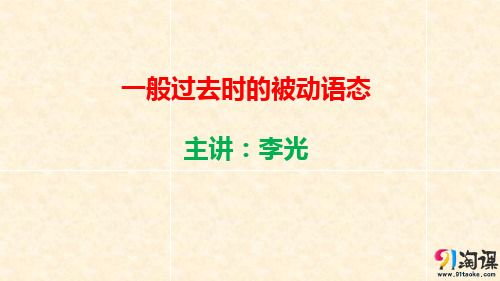
Canonical analysis
【答案】 They sold the fridge at a low price.
The fridge was sold by them at a low price.
Canonical analysis
②Somebody stole my camera from my hotel room.
主动语态变被动语态
ቤተ መጻሕፍቲ ባይዱ
Thanks for your listening!
更多精彩内容请登录:
e.g. Some new bikes were often stolen. 2. 强调动作的承受者,而不强调动作的执行者。
e.g. Your work was finished.
助记 被动语态的用法 谁的动作不知道,说出谁做没必要; 承受之人需强调,被动语态莫忘了。
Presentation
Ⅴ. 主动语态变被动语态
Canonical analysis
②(2016·天津) Paper_w__a_s_first_c_r_ea_t_e_d__about 2, 000 years ago in China.
A. is; creating B. is; created
C. has; created DD. was; created
M__y__c_a_m_e_r_a__w_a_s_s_t_o_le_n__fr_o_m__m__y__h_o_te_l_r_o_o_m__. ______ 解析:分析原句的句子结构可知,stole是谓语动词,my camera是句子 的宾语;改为被动语态句时,应将my camera作句子主语,谓语动词用 was stolen的形式。
解析:我们可用“语法分析法”解答本题。本句谓语动词 create和主语 paper(纸)之间存
被动语态的10种时态形式

被动语态的10种时态形式一、一般现在时的被动语态:被动语态的一般现在时表示主语在现在时被动地接受动作或承受行为。
构成为:be + done。
例如:1. The book is read by me.(这本书被我阅读。
)2. The door is locked by him.(门被他锁上了。
)二、一般过去时的被动语态:被动语态的一般过去时表示主语在过去时被动地接受动作或承受行为。
构成为:was/were + done。
例如:1. The cake was eaten by them.(蛋糕被他们吃掉了。
)2. The letter was written by me.(信被我写了。
)三、一般将来时的被动语态:被动语态的一般将来时表示主语在将来时被动地接受动作或承受行为。
构成为:will be + done。
例如:1. The report will be sent by her.(报告将会被她发送。
)2. The package will be delivered tomorrow.(包裹将在明天被送达。
)四、现在进行时的被动语态:被动语态的现在进行时表示主语在现在进行时被动地接受动作或承受行为。
构成为:am/is/are being + done。
例如:1. The car is being washed by the workers.(汽车正在被工人清洗。
)2. The project is being discussed by the team.(项目正在被团队讨论。
)五、过去进行时的被动语态:被动语态的过去进行时表示主语在过去进行时被动地接受动作或承受行为。
构成为:was/were being + done。
例如:1. The house was being renovated last month.(房子上个月正在进行装修。
)2. The document was being translated by the intern.(文件正在被实习生翻译。
七种被动语态形式

七种被动语态形式1) 一般现在时的被动语态(am/is/are+ 过去分词)如: The work is done during two days.2) 一般过去时的被动语态(was/were+ 过去分词)如: He was sent to the hospital immediately after the accident.3) 一般将来时的被动语态(will/shall + be + 过去分词或+ be going to + be + 过去分词)如: The work will be finished soon.4) 现在进行时的被动语态(is/am/are + being+ 过去分词)如: The bridge is now being constructed.5) 现在完成时的被动语态(have/has +been + 过去分词)如: The radio has been repaired when we phoned the shop.6) 带情态动词的被动语态(情态动词+ be + 过去分词)如: This can be done in a few minutes.7) 动词不定式的被动式(to be + 过去分词)如: It is an honor for me to be asked to speak here.现在完成时的被动语态其构成是: have/has been + done现在完成时的被动语态表示动作发生在过去, 到现在已经完成或对现在仍有影响,。
如:1. The dirty clothes have been washed.脏衣服都已经洗了。
2. The plan has been studied by the experts for three times.这项计划已经由专家研究过三次了。
现在完成时:表示从过去持续到现在,还可能继续持续下去的动作,往往和表示一段时间的状语(for+一段时间,since…, )等连用,或用于how long 句型中1. 主语是行为动作的承受者。
Unit 1 When was he born Section A--一般过去时的被动语态

Yes, it was. No, it wasn’t.
特殊疑问句:
1.定出疑问词,
When 放到句首。
1. The bridge was built in 1998. 2.was/were 提
到主语前面。
was the bridge built ? 3.句末加上问号。
Who
2. The windows were closed by Millie.
Unit 1 When was he born? Section A
--一般过去时的被动语态
英语动词有两种语态: 主动语态 (the Active Voice) 被动语态 (the Passive Voice)
A. 主动语态表示主语是动作的执行者。 We planted the tree.
B. 被动语态表示主语是动作的承受者。 The tree was planted by us.
Yes, it was.
2. The windows were closed by Millie.
Were the windows closed by Millie ? No, they weren’t.
3. This letter was received just now.
Was this letter received just now?
5.A talk on Chinese history ________ in the school hall yesterday.
A. is given B. give C. was given
were the windows closed by? What 3. This letter was received just now.
各种时态的被动语态

各种时态的被动语态一、八大时态的被动语态的构成:1.一般现在时的被动语态构成:(am/is/are +done)如:I am asked to study hard. 我被请求努力学习。
This shirt is washed once a week. 这件T恤一周洗一次。
These songs are usually sung by boys. 这些歌曲通常是男生唱的。
2.一般过去时的被动语态构成:(was/were done)如:The soldier was killed, but the train was saved. 这位战士牺牲了,然而列车得救了。
Some notes were passed up to the speaker. 有人给讲演者递上来一些纸条。
3.一般将来时的被动语态构成:(shall/will be done)如:We shall be asked a lot of strange questions. 我们将被问许多怪题。
My son will be sent to school next September. 来年九月我将送我儿子去读书。
4.过去将来时的被动语态构成:(should/would be done)如:The news would be sent to him as soon as it arrived. 消息一到就会转给他的。
He told us that the new railway would be built the next year. 他告诉我新铁路将在明年修建。
5.现在完成时的被动语态构成:(has/have been done)如:The work has just been finished. 工作刚刚结束。
The old rules have been done away with by us. 旧规章已经被我们废除了。
6.过去完成时的被动语态构成:(had been done)如:By last December three ships had been built by them. 到去年十二月底他们已建造了三艘船。
一般过去时的被动语态
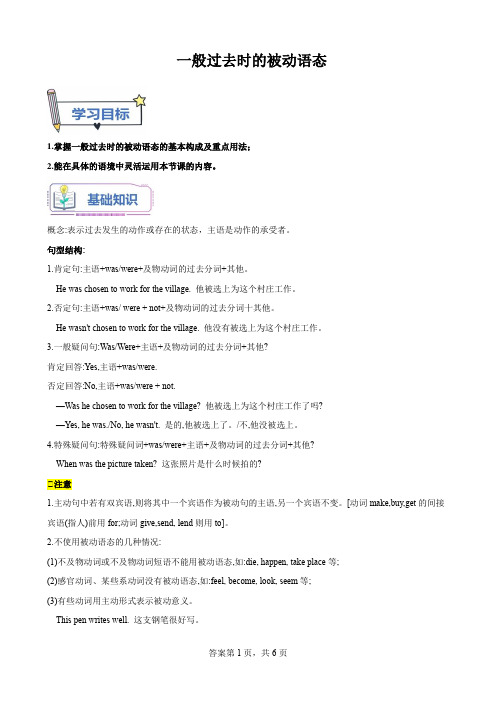
一般过去时的被动语态1.掌握一般过去时的被动语态的基本构成及重点用法;2.能在具体的语境中灵活运用本节课的内容。
概念:表示过去发生的动作或存在的状态,主语是动作的承受者。
句型结构:1.肯定句:主语+was/were+及物动词的过去分词+其他。
He was chosen to work for the village. 他被选上为这个村庄工作。
2.否定句:主语+was/ were + not+及物动词的过去分词十其他。
He wasn't chosen to work for the village. 他没有被选上为这个村庄工作。
3.一般疑问句:Was/Were+主语+及物动词的过去分词+其他?肯定回答:Yes,主语+was/were.否定回答:No,主语+was/were + not.—Was he chosen to work for the village? 他被选上为这个村庄工作了吗?—Yes, he was./No, he wasn't. 是的,他被选上了。
/不,他没被选上。
4.特殊疑问句:特殊疑问词+was/were+主语+及物动词的过去分词+其他?When was the picture taken? 这张照片是什么时候拍的?★注意1.主动句中若有双宾语,则将其中一个宾语作为被动句的主语,另一个宾语不变。
[动词make,buy,get的间接宾语(指人)前用for;动词give,send, lend则用to]。
2.不使用被动语态的几种情况:(1)不及物动词或不及物动词短语不能用被动语态,如:die, happen, take place等;(2)感官动词、某些系动词没有被动语态,如:feel, become, look, seem等;(3)有些动词用主动形式表示被动意义。
This pen writes well. 这支钢笔很好写。
1.(2023·湖南怀化·统考中考真题)The cake ______ by the hungry students quickly yesterday.A.eats B.is eaten C.was eaten2.(2023·福建南平·统考二模)ChatGPT has influenced people’s life a lot since it ________.A.is developed B.was developed C.will be developed3.(2023·黑龙江绥化·统考中考真题)The students ________ how to do eye exercises just now.A.was taught B.were taught C.taught4.(2023·四川乐山·统考中考真题)—Who’s the little girl in the photo?—It’s me. The photo ________ when I was five years old.A.took B.was taken C.is taken5.(2023·湖南株洲·统考中考真题)Panda Ya Ya ________ back to Beijing about three weeks ago.A.was brought B.is brought C.brought6.(2023·四川乐山·统考模拟预测)The building is part of Chengdu’s history. It ________ many years ago.A.was built B.is built C.built7.(2023·四川乐山·统考模拟预测)Many beautiful country hotels ________ in that village in 2022.A.will be built B.were built C.are built8.(2023·四川成都·统考二模)A 170 million-year-old “flower” ________ in Northwest China recently by Chinese scientist.A.will be covered B.is invented C.was discovered9.(2023·四川广元·统考二模)He ________ to his friend’s birthday party last Sunday.A.invites B.invited C.is invited D.was invited10.(2020春·九年级单元测试)We _______ spend too much time in watching TV.A.told don’t B.told not toC.were told not to D.were told to not11.(2023·江苏南京·统考二模)—Kitty, did you enjoy the farewell party?—Yes. We ________ well by our hosts.A.were treated B.are treated C.treated D.have treated 12.(2023·山东菏泽·统考一模)Mary looked very nervous when she ________ to the famous scientist.A.introduced B.was introduced C.is introduced13.(2023·湖南株洲·统考一模)In the big earthquake of Turkey, people ________ to the safe place by the army.A.take B.took C.were taken14.(2023·辽宁葫芦岛·统考一模)I didn’t answer when I ________.A.was asking B.asked C.am asked D.was asked15.(2023·统考一模)The visitors ________ a warm welcome when they arrived at our school.A.give B.gave C.are given D.were given16.(2023·河北邢台·邢台三中校考一模)This kid _________ to choose his own clothes from an early age.A.allows B.allowed C.will be allowed D.was allowed17.(2023·湖南郴州·统考二模)Chopsticks, an important part of Chinese culture, _______ over 3,000 years ago.A.were invented B.invented C.are invented18.(2023春·江苏无锡·九年级校考阶段练习)As soon as books ________, the volunteers posted them to the students in Hope Primary School.A.are raised B.raised C.were raised D.have raised19.(2023春·湖南岳阳·九年级校联考阶段练习)All kinds of celebrations ________ on July 1, 2021 to celebrate CPC’s 100th founding anniversary (建党100周年).A.will be held B.are held C.were held20.(2023·全国·一模)—Why hasn’t Tony come?—The invitation letter ________ to Toby by mistake.A.was emailed B.has emailed C.is emailed D.emailed21.(2023·辽宁抚顺·统考一模)Last week the old books ________ to raise money for Free the Children.A.sold B.are sold C.were sold D.sell22.(2022春·湖南岳阳·九年级统考期中)The Winter Olympics ________ in Beijing in February, 2022.A.is held B.was held C.held23.(2023·山东·统考一模)—________ you ________ to Gina’s birthday party last week?—Yes, I was. But I was too busy to be there.A.Are; invited B.Were; invite C.Are; invite D.Were; invited24.(2022春·江西赣州·九年级统考期中)The new robot which ________ last month can do many jobs for humans.A.invents B.invented C.is invented D.was invented25.(2022·江西南昌·南昌二中校联考模拟预测)—Was the old man’s house on fire last night?—Yes. Luckily, the old man ________ in time and now he is fine.A.is saved B.will save C.was saved D.had saved26.(2022春·江苏盐城·九年级校联考期中)—Did the doctor save the girl?—Yes, she ________ on the morning of May 10th. She is out of danger now.A.was operated on B.operated on C.was operated D.operated 27.(2022春·上海闵行·九年级上海市实验学校西校校考期中)After Shanghai Disney Resort ________, it became a new tourist attraction.A.completed B.complete C.is completed D.was completed28.(2022春·上海徐汇·九年级上海市徐汇中学校考期中)The doctor looked over Peter carefully after he________ to the hospital.A.is taken B.has taken C.was taken D.took29.(2023·福建漳州·统考模拟预测)The Qatar World Cup ________ on November 20th, 2022.A.held B.was holding C.was held30.(2023·湖北武汉·模拟预测)—Who is the baby in the photo?—It’s me. The photo ________ fourteen years ago.A.was taken B.has taken C.is taken D.will take31.(2022春·福建福州·九年级校考期中)The Beijing 2022 Winter Olympics ________ successfully.A.will be held B.was held C.held32.(2022·黑龙江哈尔滨·统考二模)—Do you know when and where the 24th Winter Olympic Games________?—In Beijing and Zhangjiakou, in 2022. We all like the mascot (吉祥物) of it “Bing Dwen Dwen” (冰墩墩).A.were held B.was held C.held33.(2022·江西·校联考模拟预测)Mary went to hospital and she ________ about the importance of brushing the teeth every day.A.told B.is told C.was told D.has told34.(2022·新疆吐鲁番·校考一模)A number of volunteers _______ for the 2022 Beijing Winter Olympic Games.A.will be needed B.were needed C.are needing D.was needed35.(2022·江苏徐州·校考三模)—Why have I never seen this kind of 5G mobile phone?—Because it ________ by HUAWEI last week.A.has produced B.would produce C.was produced D.was producing36.(2023·北京·统考一模)—Mike ________ a job in a bank, but to our surprise, he didn’t take it.—Maybe he got another job.A.is offered B.was offered C.offered D.has offered37.(2022·四川广元·校考模拟预测)In the book I learned that women ________ to take part in the Olympics in the past.A.won’t be allowed B.weren’t allowed C.aren’t allowed D.didn’t allowed38.(2022·福建厦门·福建省同安第一中学校考模拟预测)Over 40 papers ________ by Chinese scientists in the past, based on the data collected by FAST (中国天眼).A.wrote B.are written C.were written39.(2022·吉林长春·吉林大学附属中学校考模拟预测)—You should say sorry to Tony. After all, this basketball ________ by you just now.—OK. I will.A.is broken B.was broken C.had broken D.has broken40.(2022·吉林长春·校考模拟预测)The telephone ________ by Alexander Graham Bell in 1876. It helps people a lot.A.invents B.invented C.is invented D.was invented41.(2022·吉林长春·校考三模)My advice on how to save water ________ by my classmates last Friday.A.accepts B.is accepted C.accepted D.was accepted42.(2022秋·广西南宁·九年级统考期末)The library which _________ a year ago is a nice place for people to read and relax.A.is built B.will be built C.was built43.(2022秋·辽宁大连·九年级统考期末)— It’s reported that 31 of the brave young men ________ in a big forest fire in Sichuan.— I don’t know who they are, but I know who they are for.A.had killed B.killed C.will kill D.were killed44.(2022秋·湖北武汉·九年级校联考期中)The old building ________ down to make room for the city library last year.A.has been taken B.was taken C.would be taken D.is taken45.(2022秋·陕西西安·九年级交大附中分校校考期中)— Is there anything new in today’s newspaper?— Yes. A library with five thousand books ________ to Hope School as a gift yesterday.A.is offered B.was offered C.are offered D.were offered46.(2023春·湖北襄阳·九年级襄阳四中校考阶段练习)—Who is Wang Yaping?—An excellent astronaut who took part in the Shenzhou X mission in 2013, ________ for Shenzhou XIII inOctober, 2021.A.chose B.have chosen C.is chosen D.was chosen47.(2022秋·江苏盐城·九年级景山中学校考期末)Do you know when America ________?A.was discovered B.discovered C.was invented D.invented48.(2022秋·河北石家庄·九年级统考期末)The Hong Kong-Zhu Hai-Macao Bridge ________ in 2018. We are excited about it.A.is completed B.is completing C.was completed D.was completing49.(2022秋·河北保定·九年级统考期末)Miss. Liu ________ to give a speech to the graduating class.A.invites B.was invited C.invited D.has invited50.(2021秋·湖北武汉·九年级校联考期中)Wang Yaping, who took part in the Shenzhou X mission in 2012, ________ for Shenzhou XⅢ in December 2019.A.selected B.have selectedC.is selected D.was selected。
七种被动语态形式

七种被动语态形式1) 一般现在时的被动语态(am/is/are+ 过去分词)如: The work is done during two days.2) 一般过去时的被动语态(was/were+ 过去分词)如: He was sent to the hospital immediately after the accident.3) 一般将来时的被动语态(will/shall + be + 过去分词或+ be going to + be + 过去分词)如: The work will be finished soon.4) 现在进行时的被动语态(is/am/are + being+ 过去分词)如: The bridge is now being constructed.5) 现在完成时的被动语态(have/has +been + 过去分词)如: The radio has been repaired when we phoned the shop.6) 带情态动词的被动语态(情态动词+ be + 过去分词)如: This can be done in a few minutes.7) 动词不定式的被动式(to be + 过去分词)如: It is an honor for me to be asked to speak here.现在完成时的被动语态其构成是: have/has been + done现在完成时的被动语态表示动作发生在过去, 到现在已经完成或对现在仍有影响,。
如:1. The dirty clothes have been washed.脏衣服都已经洗了。
2. The plan has been studied by the experts for three times.这项计划已经由专家研究过三次了。
现在完成时:表示从过去持续到现在,还可能继续持续下去的动作,往往和表示一段时间的状语(for+一段时间,since…, )等连用,或用于how long 句型中1. 主语是行为动作的承受者。
各种时态的被动语态

各种时态的被动语态各种时态的被动语态一、八大时态的被动语态的构成:1.一般现在时的被动语态构成:(am/is/are +done)如:I am asked to study hard. 我被请求努力学习。
This shirt is washed once a week. 这件T恤一周洗一次。
These songs are usually sung by boys. 这些歌曲通常是男生唱的。
2.一般过去时的被动语态构成:(was/were done)如:The soldier was killed, but the train was saved. 这位战士牺牲了,然而列车得救了。
Some notes were passed up to the speaker. 有人给讲演者递上来一些纸条。
3.一般将来时的被动语态构成:(shall/will be done)如:We shall be asked a lot of strange questions. 我们将被问许多怪题。
My son will be sent to school next September. 来年九月我将送我儿子去读书。
4.过去将来时的被动语态构成:(should/would be done)如:The news would be sent to him as soon as it arrived. 消息一到就会转给他的。
He told us that the new railway would be built the next year. 他告诉我新铁路将在明年修建。
5.现在完成时的被动语态构成:(has/have been done)如:The work has just been finished. 工作刚刚结束。
The old rules have been done away with by us. 旧规章已经被我们废除了。
各种时态的被动语态
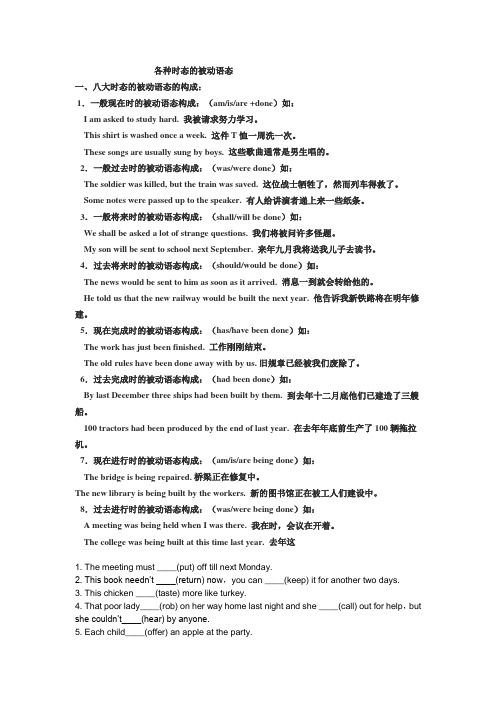
各种时态的被动语态一、八大时态的被动语态的构成:1.一般现在时的被动语态构成:(am/is/are +done)如:I am asked to study hard. 我被请求努力学习。
This shirt is washed once a week. 这件T恤一周洗一次。
These songs are usually sung by boys. 这些歌曲通常是男生唱的。
2.一般过去时的被动语态构成:(was/were done)如:The soldier was killed, but the train was saved. 这位战士牺牲了,然而列车得救了。
Some notes were passed up to the speaker. 有人给讲演者递上来一些纸条。
3.一般将来时的被动语态构成:(shall/will be done)如:We shall be asked a lot of strange questions. 我们将被问许多怪题。
My son will be sent to school next September. 来年九月我将送我儿子去读书。
4.过去将来时的被动语态构成:(should/would be done)如:The news would be sent to him as soon as it arrived. 消息一到就会转给他的。
He told us that the new railway would be built the next year. 他告诉我新铁路将在明年修建。
5.现在完成时的被动语态构成:(has/have been done)如:The work has just been finished. 工作刚刚结束。
The old rules have been done away with by us. 旧规章已经被我们废除了。
6.过去完成时的被动语态构成:(had been done)如:By last December three ships had been built by them. 到去年十二月底他们已建造了三艘船。
一般过去时的被动语态

3. 含双宾语和复合宾语的主动句变为被动语 态的方法
①含有双宾语的主动句变为被动语态时,通常 把指 “人”的间接宾语变为主语,而指“物” 的直接宾语则不变 He gave me a book yesterday. I was given a book (by him) yesterday
5. We saw Jim come in. Jim was seen to come in.
Watson. In 1875, Mr. Bell__le_a_r_n_t_ (learn) how to send musical notes
through an instrument similar to a telephone. Finally, the telephone _w_a_s_i_n_v_e_n_t_ed__ (invent) in 1876. The first sentence that _w_a_s__sa_i_d_ (say) on the telephone by Mr. Bell was “Mr. Watson, come here; I want to see you.” Today the telephone _i_s_u_s_e_d__ (use) around the world.
5. The cookies w__e_r_e_e_a_te_n_ by the hungry kids in less than 20 minutes, and they really _l_ik_e_d_ them.
4c Decide whether active or passive forms should be used in these sentences. Write the correct forms in the blanks.
一般过去时被动语态

一般过去时被动语态
一、结构域句式
二、含不定式作宾语补足语时,变被动语态的情况
在ask/encourage/tell sb. to do sth.固定搭配中,含有不定式作宾语补足语,在变被动语态时,只要把主动语态时的宾语提到句首作主语,宾语补足语的位置则不变。
例句:His parents encouraged him to go abroad for further study
He was encouraged to go abroad for further study by his parents.
三、含双宾语时,变被动语态的情况
1.含双宾语的句式
2.方法
含双宾语的句子变为被动语态时,常把间接宾语变为主语,直接宾语仍放在动词之后不变。
也可用直接宾语作主语,而间接宾语需要用介词“to”或“for”引导。
My father bought me a new bike.我爸爸给我买了一辆新自行车。
I was bought a new bike.( 间接宾语作主语)
A new bike was bought for me.(直接宾语作主语)。
一般过去时被动语态是什么

一般过去时被动语态是什么一般过去时的被动语态的基本结构是:be动词的过去式(was、were)+动词的过去分词+其他形式。
其表示过去某一时间的被动动作或过去经常性、习惯性的被动动作。
1.肯定句结构:主语+was/were+动词过去分词+其他eg: A new shop was built last year.去年新建了一家商店。
eg: Dinosaur eggs were laid long long ago.恐龙蛋是很久以前产的。
2.否定句结构:主语+was/were+not+动词过去分词+其他eg: The computers were not bought last week.上周没有买电脑。
3.一般疑问句结构:Was/Were+主语+动词过去分词+其他?eg: Were the computers bought last week?上星期买的电脑吗?4.特殊疑问句结构:特殊疑问词+was/were+主语+动词过去分词+其他?eg: When were the computers bought?电脑是什么时候买的?注:(1)若句子中含有双宾语,在改为被动语态时,遵循以下方法:1.将间接宾语转化为句子主语。
She gave the little girl some flowers.她给了那个小女孩一些花。
The little girl was given some flowers by her.2.将直接宾语转化为句子主语,此时间接宾语前通常加上介词to或for(何时用to,何时用for,)。
例:They bought the children many good books.他们给那些孩子买了许多好书。
rarr;Many good books were bought for the children by them.例:He lent me a pen.能借给我一支钢笔。
rarr;A pen was lent tome by him.(2)在不定式作宾语补足语的结构中,改为被动语态时,把主动语态中的宾语提到被动语态主语的位置,宾语补足语的位置不变。
- 1、下载文档前请自行甄别文档内容的完整性,平台不提供额外的编辑、内容补充、找答案等附加服务。
- 2、"仅部分预览"的文档,不可在线预览部分如存在完整性等问题,可反馈申请退款(可完整预览的文档不适用该条件!)。
- 3、如文档侵犯您的权益,请联系客服反馈,我们会尽快为您处理(人工客服工作时间:9:00-18:30)。
compete for v. to strive with another or others to (和 attain a goal (和)……争夺;力争获取 争夺;力争获取 eg. 1) He was clever enough to compete for the mathematics scholarship. 他很聪明,完全能获得数学奖学金。 2) These young men compete for the silver medal. 这些年轻人争夺银牌。
Language focus P156 动名词 概念: 1)动名词具有名词的功能,可以起相当于名词 的作用。 2)它与其它动词非谓语形式一样,也具有动词 的某些特征,可以有自己的宾语和状语,并可同 它的宾语、状语等一起构成动名词短语。 形式: 动词原形 + ing
动名词的句法作用 1. 作主语 A) 动名词作主语也可以用先行词it作形式主语,而 动名词作主语也可以用先行词it作形式主语,而 it 把动名词短语置于后部。这种用法通常见于:It It’s 把动名词短语置于后部。这种用法通常见于:It s no fun等 ing, use (useless, no good, nice, fun等) + -ing,或There ing。 is no use + - ing。 动名词和不定式作主语在意义上有一定的差别: B) 动名词和不定式作主语在意义上有一定的差别: 通常动名词泛指一般动作,而不定式表示具体动作。
eg. 1) Who left? 谁离开了? 谁离开了 2) Who gave you that book? 谁给你的那本书? 3) What are you having for dinner? 你晚饭吃什么? 你晚饭吃什么 4) What did she say? 她说什么了? 她说什么了 5) Whom did you meet in the street yesterday? 昨天你在街上遇见了谁? 昨天你在街上遇见了谁
stage v.to arrange and carry out: 发起;举行, 上演 eg. 1) Next year shanghai will stage a boxing match. . 明年上海将进行一台拳击比赛。 2) Our school stages a play every year. 我们学校每年上演一台戏
2) A memorial meeting was held in his honor. 举办了纪念会以悼念他。
价值…的,顶得上 worth prop./a. 1) 价值 的,顶得上 eg. 1) This is a car worth $20,000. , . 价值2 价值2万美元的一辆小汽车。 2) How much is this toy worth? That toy is worth ? little. . 这玩具值多少钱?这个玩具不值钱。 3) A bird in the hand is worth two in the bush. . 双鸟在林不如一鸟在手。
eg. soldier? 1) Was the song composed by a soldier? 这首歌是由一名士兵创作的吗? 这首歌是由一名士兵创作的吗? 2) Such books were written for children. 以前这种书是儿童读物。 3) We were shown the machines they had turned out. 他们让我们参观了他们生产的机器。
represent v. to stand for; symbolize: 代表代表;象 征: eg. 1) The bald eagle represents the United States. 秃鹰象征了美国。 2) These stones represent armies. 那些石头代表部队。
连词 If 引导的真实条件, 引导的真实条件, 概念: 1) 条件状语表示“如果……,那么 条件状语表示“如果 ,那么……”, 这种条 ” ,那么 件是可以实现的。 2) if 引导的从句位于主句之前时,要用逗号。在主 句之后则不用逗号。 如果条件状语是将来时, 3) 如果条件状语是将来时, 只能用一般现在时表示。 形式: 从句:If 从句:If 主语 + 谓语(一般现在时), 主句:主语 + will/won’t(情态动词)+ 动词 原形 will/won t 情态动词)+
name v. to give a name to: 给…以名字: 以名字: eg. 1) We named the child after both grandparents. 我们以孩子祖父母的名字给他取名。
2) The boy was named George after his uncle. 那孩子随他舅父的名子取名乔治。
2. 作宾语和介词的宾语 (有些动词后面只能接动名词 作宾语,不能接动词不定式。例如: suggest, avoid, enjoy, admit ,mind, consider …) ) eg. 1) The boys avoided fighting. . 男孩子们避免了斗殴。 2) He suggested going out for a walk. . 他建议出去走走。 3) She is good at telling lies. . 她很会撒谎。 4) Before driving any of the buses, they will have to , pass a special test. 在驾驶公共汽车前, 在驾驶公共汽车前, 他们必须通过专门测验。
Unit 9 I. Grammar II. Vocabulary
I. Grammar
Language focus P147 一般过去时的被动语态 概念:被动语态表示主语是动作的承受者。 概念:被动语态表示主语是动作的承受者。 在以下三种情况下,常用被动语态。 在以下三种情况下,常用被动语态。 1) 强调动作的承受者,而不强调施动者。 ) 强调动作的承受者,而不强调施动者。 2) 不必提及施动者。 ) 不必提及施动者。 3) 不知道施动者。 ) 不知道施动者。 详见书本P148 详见书本
(have an/the) effect on n. the result of a particular influence 影响;效果;作用 eg. 1) The medicine had the effect of making me sleep. 我吃了这种药想睡觉。 2) This had a great effect on on the future of both mother and son. 这件事对母亲和孩子的未来都有极大的影 响。
II. Vocabulary
Activity 1 one’s in honor of … = in one s honor 为了(纪念或表示敬 意而举行某活动) eg. 1) I have cooked a special meal in honor of our visitors. 我做了一道特殊的菜向我们的来客表示敬意。
Language focus P151 (详见P151 P151) 构词法 (详见P151)
Language focus P153 对主语和宾语提问的疑问词 1) 疑问代词 who 在疑问词中充当主语,对主语提 问不用助动词。 形式: 其它成分? 形式:who + 谓语动词 + 其它成分? whom在疑问词中充当宾语, 2) 疑问代词 what / whom在疑问词中充当宾语, 对宾语提问要用助动词。 形式: 其它成分? 形式:what + 助动词 + 动词原形 + 其它成分?
eg. 1) You may stay here if you keep quiet. . 如果你保持安静你可以待在这儿。 2) If I have time, I ll go to the meeting together with , I’ll you. 如果我有空,我将和你一起去开会。 3) If that is true, what should we do? , 假设那是真的我们该怎么办呢? 假设那是真的我们该怎么办呢? 4) She will play the piano only if she is paid. . 只有付给她报酬,她才愿意演奏钢琴
in advance 先 eg.
ahead of time; beforehand. 提前;
1) They used to pay the rent in advance. 他们老是预付房钱的。 month’s 2) I received one month s salary in advance. 我得预支一个月得薪水。
Activity 12 bid (for) v./n. offer or propose (an amount) as a price. 出 价,投标 eg. 1) He bid $5 for an old book. 他为一本旧书出价5 他为一本旧书出价5美元。 2) Park wants to sell his farm, and he has already had two large bids for it. . 帕克想卖掉他的农场,并且已经有两个出大价的 买主。
eg.
than by bus. 与汽车相比,乘火车更舒适。
1) Traveling by train is more comfortable
2) It is no use talking so much about this. . 这种事多说也无济于事。
动名词和不定式的区别 1) Selling old houses is difficult. 卖老房子是困难的。(泛指一般动作) 卖老房子是困难的。(泛指一般动作) 2) To sell my old house is difficult. 把我的老房子卖出去是很难的。( 把我的老房子卖出去是很难的。(谈论一个 特定的动作) 特定的动作)
